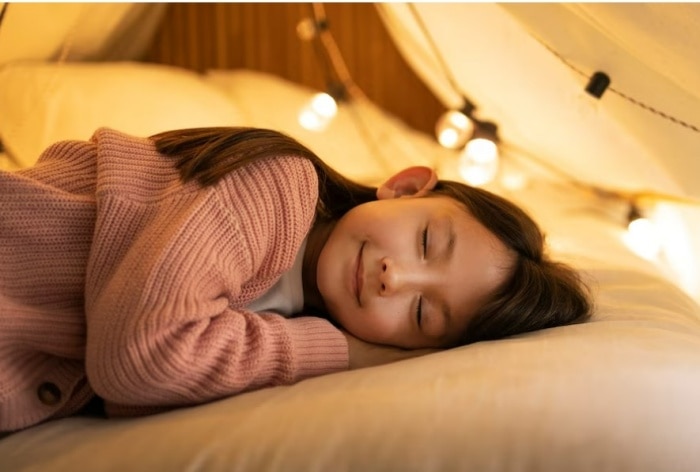Light in or out, there are several viewpoints on if we should sleep with lights switched on or off.

Lights out! A common phrase we all have heard some time in our childhood. Every night we went to bed, our planets made sure the light are off. Lights off just meant that either there is no one at home or people are simply asleep. It is not uncommon when people say how they cannot sleep with lights on while on the other hand, there are few who will say how they need that little shine of light. Then comes a theory where people debate if sleeping with lights on is actually healthy or not?
Everybody has their own way of living, their own way of sleeping. And let’s find is sleeping with lights on healthy or not?
IS SEEPING WITH LIGHTS ON GOOD OR BAD FOR HEALTH?
According to experts, sleeping in a dark environment for optimal rest and well-being because exposure to light at night can disrupt the body’s natural sleep-wake rhythm, known as the circadian rhythm. Sleeping with the lights on can lead to fragmented sleep and decreased sleep quality. Even dim lights can affect sleep architecture, resulting in shallower sleep, less REM (Rapid Eye Movement) sleep, and an overall less restful sleep experience.
This can leave you feeling groggy, tired and less mentally fit during the day. Chronic exposure to light at night has been associated with an increased risk of developing sleep disorders such as insomnia. Light exposure can make it harder for your brain to initiate and maintain sleep, worsening the symptoms of insomnia.
Sleeping with lights on may contribute to mood disorders such as depression and anxiety. Disrupted sleep patterns can disrupt neurotransmitter balance and affect emotional regulation, leading to increased vulnerability to mental health issues.
Sleeping with lights on can have a negative impact on the quality of your sleep and overall health. Exposure to artificial light, especially bright or blue light emitted by electronic devices or certain types of bulbs, can interfere with the body’s natural sleep-wake cycle. This cycle, known as the circadian rhythm, is regulated by the release of the hormone melatonin, which is suppressed by light. It has been associated with an increased risk of obesity, diabetes, cardiovascular diseases, and certain types of cancer. However, more research is needed to establish the causal relationship and understand the underlying mechanisms fully.
What is the relation between lights and sleeping?
Exposure to light, especially natural sunlight, during the day helps to synchronise our internal clock and promotes wakefulness. It signals to the brain that it is daytime and inhibits the production of melatonin, a hormone that helps regulate sleep. This is why exposure to bright light in the morning can be beneficial for promoting alertness and maintaining a healthy sleep-wake cycle.
Conversely, exposure to light, particularly in the evening and during nighttime hours, can have a disruptive effect on our sleep. Artificial light, especially blue light emitted by electronic devices such as smartphones, tablets, and computers, as well as certain types of light bulbs, can suppress the production of melatonin and hinder the onset of sleep. This can lead to difficulty falling asleep and result in poor sleep quality.
Creating a sleep-friendly environment by keeping the bedroom dark, using blackout curtains or an eye mask, and minimizing exposure to artificial light before bed can help promote better sleep quality and overall well-being.

Don’t Miss Out on the Latest Updates.
Subscribe to Our Newsletter Today!

Stay connected with us on social media platform for instant update click here to join our Twitter, & Facebook
We are now on Telegram. Click here to join our channel (@TechiUpdate) and stay updated with the latest Technology headlines.
For all the latest Lifestyle News Click Here
